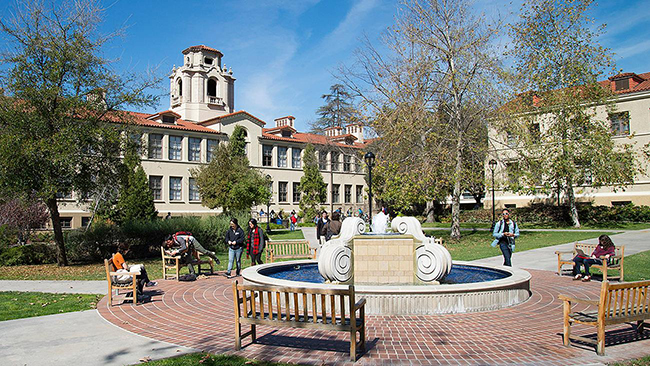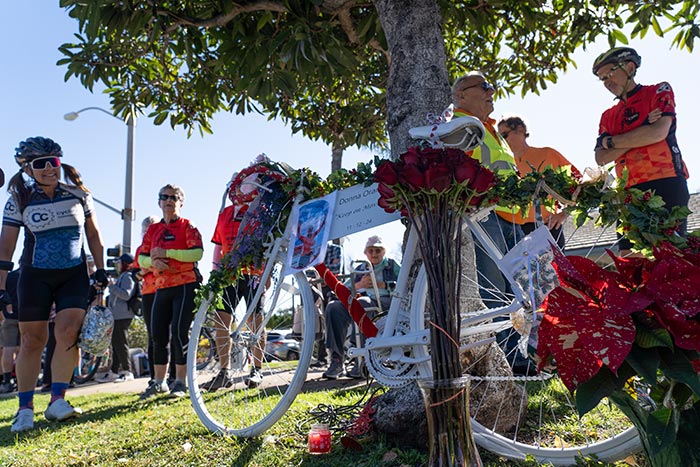Film addresses epidemic of rape on college campuses
On March 3, students from the Claremont Colleges turned out to Scripps’ Garrison Theatre by the dozens to watch a preview of the documentary The Hunting Ground.
The film’s subject—the startling number of rapes that occur on college campuses and the routinely inadequate response by college administrators—could not have 
The movie, directed by Kirby Dick and produced by Amy Ziering (The Invisible War), premiered at the Sundance Festival in January and has been generating accolades, as well as controversy among school administrators who say they are being maligned without being given a chance to respond.
In advance of its general release, The Hunting Ground is being shown on campuses across the nation, with more than 1,000 colleges requesting an advanced screening of the movie. The tagline, “Their dream school will become a nightmare,” refers to the one in five women who will be sexually assaulted while in college, according to a 2007 Justice Department study.
It is a number that’s indicative of an epidemic. The documentary seeks to go beyond statistics, however, putting a face on rape survivors. These include victims-turned-activists Annie E. Clark and Andrea Pino, co-founders of the nonprofit organization EROC (End Rape on Campus).
Ms. Clark was raped in 2007 as a freshman at University of North Carolina at Chapel Hill. When she reported the crime to UNC administration, she encountered blame, not support. One UNC staffer even advised her to look back on the event as if she were a quarterback after a losing football game, asking what she could have done differently.
When Ms. Pino, a UNC sophomore, was violently sexually assaulted in 2012, she too failed to gain administrative support. She reached out to Ms. Clark, who had begun researching ways to challenge what she viewed as the college’s institutionalized tolerance of rape.
In January 2013, Ms. Pino and Ms. Clark, along with several other UNC students and a former administrator, filed a Title IX complaint against the University with the US Department of Education’s Office of Civil Rights (OCR).
Title IX legislation prohibits any education program that receives federal funding from discriminating on the basis of gender. In their complaint, Ms. Pino, Ms. Clark and their fellow complainants argued that by failing to abet rape victims and to punish rapists, the University of North Carolina at Chapel Hill was creating an inherently unequal atmosphere in which female students feel unsafe attending the school.
The OCR as well as the Clery Compliance Division, which ensures that colleges are reporting crimes on and around campus, launched an investigation of the campus. This past August, UNC announced a new and more stringent sexual misconduct policy.
After filing their complaint, the women began traveling across the country, helping rape survivors and allies file Title IX complaints against 24 universities, with successful campaigns including those at Dartmouth College, Swarthmore College, Occidental College, the University of California, Berkeley and the University of Southern California. More than 100 colleges are now under investigation for possibly violating federal laws intended to keep students safe.
The rape survivors in The Hunting Ground share similar stories. In most cases, the women were at a social event where they became drunk or were drugged. They were convinced or coerced to accompany a fellow student somewhere private and then assaulted. One convicted rapist, a repeat offender interviewed in the film, said predators like himself single out a vulnerable victim ahead of time and then act to get her alone.
When the women and a couple men profiled in the documentary came forward about being raped on campus, they say the school administration did not satisfactorily pursue the issue.
The 100 rape survivors interviewed in the film typically reported their rapes were under-investigated, unprosecuted and unpunished. Many experienced a secondary trauma after their assault: Their rapist still attended their school or an associated campus.
Their story is backed up by telling statistics: From 1996 to 2013, the 259 reported sexual assaults at Stanford led to only one expulsion.
However commonplace the story is, sometimes it makes headlines, as in the case of Erika Kinsman.
In the film, Ms. Kinsman, 20, alleges she was drugged and then brutally raped by Seminoles quarterback Jameis Winston in 2012, her freshman year at Florida State University. She immediately reported the rape and was taken to the hospital and administered a rape kit.
When she identified her attacker to local police, she was told that Tallahassee is “a big football town” and cautioned that she should “think long and hard before proceeding against him because she will be raked over the coals and her life will be made miserable.”
The Tallahassee police department didn’t process her rape kit for a year. When they did, it was a positive match for Mr. Winston’s DNA.
Despite the results, Mr. Winston denies he raped Ms. Kingman. State Attorney Willie Meggs admitted in a press conference shown in the film that “things that happened that night were not good.” He ultimately opted not to charge the athlete with rape because he said there was insufficient evidence to prove the encounter was nonconsensual.
In December of 2013, Mr. Winston became the youngest Heisman Trophy winner. He is now expected to be one of the top picks in the NFL draft in April.
In the meantime, the policeman’s warning has proved prescient.
“All these people were praising him…and calling me a slut, a whore,” Ms. Kinsman says in the film.
She has been on the receiving end of hate mail, Internet bullying and death threats. It is so bad, Ms. Pino told the COURIER after the screening, that Ms. Kinsman must have a bodyguard with her at all times.
If it sounds like a nightmare, Ms. Clark and Ms. Pino say the Winston/Kinsman case is business as usual for many colleges. Athletes are often protected from repercussions from sexual assault because school sports, particularly at Division I schools that draw big crowds and TV viewers, are huge moneymakers.
Some fraternities are rife with violence against women, according to the filmmakers. In one scene in The Hunting Ground, a number of students are asked what the initials of the fraternity Sigma Alpha Epsilon stand for. The answer by students, many of whom say they have been warned not to attend SAE parties, is chilling: “Sexual Assault Expected.”
Parents of prospective college student might also shudder at a scene where members of the Yale University Chapter of Delta Kappa Epsilon are seen surrounding the freshman women’s dorms, chanting, “No means yes, yes means anal!”
The filmmakers contend colleges are hesitant to interfere with the rape culture that has infiltrated a small but destructive portion of the fraternity system because frat brothers are the college’s biggest source of giving. And, the filmmakers assert, school administrators as a whole are motivated to hush up sexual assault reports in order to protect their university’s “brand.”
The film ends on a note of hope, however, as viewers see evidence of a growing amount of empowerment and activism on the part of sexual assault victims and allies and reform on the part of colleges.
At the end of the screening, Ms. Pino, joined by Title IX coordinators from the Claremont Colleges, answered questions from the audience. Wendy Lower, head of the Center for Human Rights (CHR) at Claremont McKenna College, took a moment to announce that a cross-campus sexual assault resource center, which has already been funded, will break ground in the fall.
Isabel Wade, a student at CMC, said that the film highlights a very real problem. She knows several fellow students who have been assaulted and was jarred to recognize one of the young women who came forward in the film as a rape survivor. She had previously met her at a debate tournament.
“I’m really glad they put together this opportunity to show this to the college students. It hits close to home,” she said. “It’s very impactful.”
If you, or a loved one, has been sexually assaulted, Project Sister offers crisis intervention services. Their 24-hour hotline can be reached at (909) 626-4357 or (626) 966-4155.
—Sarah Torribio
storribio@claremont-courier.com
CMC’s guidelines expand definition of sexual assault
When it comes to the way colleges address potential sexual assaults, times they are a changing. Once, the general refrain was “No means no.”
Many, however, have come to believe that philosophy is inadequate. After all, many students have reported being raped while drunk, high or unconscious, in some cases after being given a date rape drug.
With this in mind, Governor Jerry Brown approved Senate Bill No. 967 in September 2014. The statute, which has been added to the state’s education code, has been called the “yes means yes” law. Among other stipulations, the law mandates that schools adopt an “affirmative consent” standard.
“It is the responsibility of each person involved in the sexual activity to ensure that he or she has the affirmative consent of the other or others to engage in the sexual activity,” the bill explains. “Lack of protest or resistance does not mean consent, nor does silence mean consent. Affirmative consent must be ongoing throughout a sexual activity and can be revoked at any time.”
Preventing and addressing sexual assault on college campuses has also become a federal priority. In September of 2014, President Barack Obama launched an “It’s On Us” campaign. The campaign includes educational measures, such as guidelines students can follow to help intervene in situations: “Be aware if someone is deliberately trying to intoxicate, isolate, or corner someone else. Get in the way by creating a distraction, drawing attention to the situation, or separating them.”
It also suggests that students, if they become aware someone has been sexually assaulted, avoid detrimental behaviors like victim blaming.
Other aspects of the “It’s On Us” campaign include the creation of the White House Task Force to Protect Students from Sexual Assault and a thorough review of existing laws to “make sure they adequately protect victims of sexual assault.”
So it was timely when Claremont McKenna College unveiled its new “Discrimination, Harassment and Sexual Misconduct Policy” in their 2014-2015 Guide to Student Life.
The policy is a lengthy one, and seeks to ensure that both parties clearly and unequivocally consent to any sexual activities. The policy emphasizes that clear consent must be evident during each stage of a sexual encounter and once consent has been withdrawn—which can be done at any stage in an encounter—that a student cease their sexual advances.
The policy emphasizes that, while withdrawal of consent may be accompanied by the word “no,” it may also be communicated via less direct language or even nonverbal cues.
Students should be aware, according to the CMC policy, that a withdrawal of consent can “be based on an outward demonstration that conveys that an individual is hesitant, confused, uncertain or is no longer a mutual participant.”
CMC’s policy has drawn accolades among many people who feel that colleges have been too narrow in their definition of rape and too lax when it comes to disciplining students who have crossed the line.
It has also, however, triggered concerns, some of which were explored in a June 2014 NPR article called “A Campus Dilemma: Sure, ‘No Means No,’ But Exactly What Means ‘Yes’?”
Some people feel affirmative consent policies make it easy for a student who doesn’t pick up on potentially subtle cues to be accused of rape or sexual misconduct and subject to a criminal or school hearing in which the punishment is expulsion or worse.
“It is tragically clear that this campus rape crusade bill presumes the veracity of accusers (‘aka survivors’) and likewise presumes the guilt of accused (‘virtually all men’) Gordon Finley, a professor emeritus at Florida International University and adviser to the National Coalition for Men on the nonprofit’s website.
CMC administrators say it’s a tricky situation, trying to ensure that all students’ civil rights are protected while addressing the very real problem of campus rape.
“If consent were easy to put into words, we’d have a sentence, and we wouldn’t have a page and a half of definition,” Mary Spellman, dean of students for Claremont McKenna College, said in the NPR story.
Ms. Spellman admits the new verbiage, which says both people involved in a sexual encounter should express words and behaviors that show their acts are “clear, knowing and voluntary” and “active, but not passive” is a work in progress.
“I don’t think [the definition] is perfect,” Ms. Spellman said. “I think it’s come a long way, but I think we will find over time that it will evolve.”
Ms. Lower said rape is always a difficult subject to tackle, so much so that it didn’t really begin to be publically addressed through research and legislation until the 1970s. But she applauds CMC for trying to improve its response to allegations of rape and to publically address what many see as a human rights crisis.
“This is a national discussion,” she said. “We are a college, an undergraduate institution, so it’s in our interest to learn about this—to educate our students, male and female, and to ward against it.”
After the screening, some of the young men in her classes expressed some wariness, saying that they sometimes feel like they are viewed as likely perpetrators because of their gender or status as a student athlete.
“Rape is a special kind of crime,” Ms. Lower said. “The only way to deal with it is to have a dialogue between men and women to try to understand why it’s happening, and not alienate either young men or women.”
You can find the school’s policy on the www.cmc.edu website via the search function.
—Sarah Torribio
storribio@claremont-courier.com










0 Comments